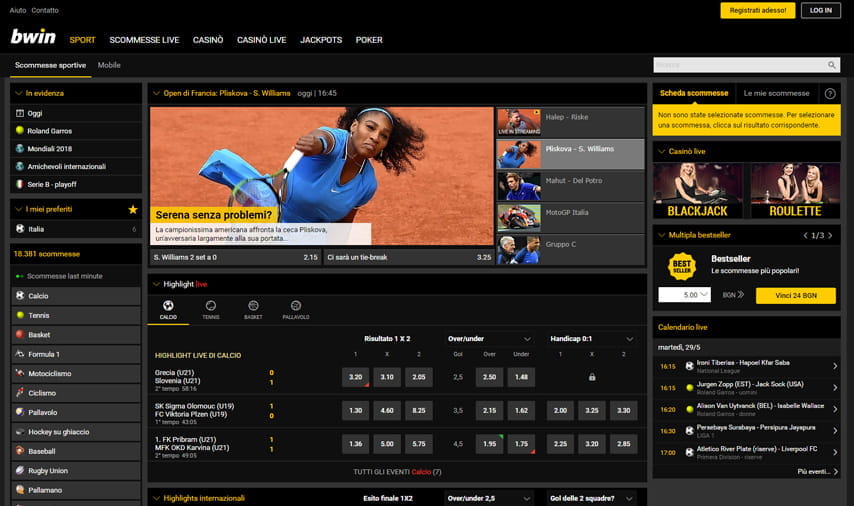Perché i casinò non AAMS sono popolari tra gli europei
Per noi, al momento, SNAI è il miglior sito scommesse. Se sei interessato a Librabet, troverai una recensione più dettagliata nelle prime parti di quest’articolo. Giocare su un portale autorizzato significa ovviamente poter contare sulla massima protezione dei propri fondi e dei propri dati personali, ma anche di partecipare a giochi, promozioni, bonus e piazzare scommesse in maniera assolutamente trasparente e regolare. Dai mercati delle scommesse sportive e quote competitive a una varietà di giochi da casinò, gli utenti possono godere di una vasta gamma di opzioni che rendono le scommesse emozionanti e divertenti. Semplice da contattare il servizio clienti, pronto a rispondere a qualsiasi domanda o dubbio. I metodi di pagamento più popolari disponibili per i giocatori italiani con le migliori valutazioni. Dopo il deposito, riceverete un bonus dal 100% al 500% dell’importo depositato. Scegliere un buon sito non AAMS significa anche controllare che Sportaza rispetti una certa trasparenza riguardo i metodi di prelievo e di deposito ed i loro tempi di elaborazione. È quindi importante che i giocatori riconoscano i siti illegali non AAMS e comprendano i vantaggi di utilizzare invece i siti di scommesse AAMS ora ADM. Infatti, ci sono molti bonus a disposizione dei giocatori. Una dei vantaggi più ricercato in un sito di scommesse sono i bonus di benvenuto, cioè quei bonus che permettono di incrementare il proprio conto gioco quando si deposita la prima somma di denaro per scommettere.

Come valutare i migliori siti scommesse non AAMS legali?
Il mondo delle scommesse e del divertimento digitale offre tantissime varianti pensate per ogni tipo di utente e, ovviamente, nell’ambito del gioco d’azzardo e dei casino online ciò non poteva essere da meno. Sui siti scommesse invece i bonus di https://www.agid.gov.it/ benvenuto hanno bassi requisiti di puntata, ovvero più facili da convertire poi in denaro reale. La licenza è stata concessa dal Governo di Curacao. 100€ Gratis + 100 Giri Gratis. In questo caso, potrai vedere alcuni esempi delle migliori case di scommesse per calcio, tennis, basket, esports e pallanuoto. Inoltre su questa piattaforma è disponibile l’ottima opzione di cashout molto apprezzata dagli utenti dei siti scommesse. Betcake, anche se senza AAMS, dimostra quanto può essere affidabile il settore igaming. È possibile fidarsi dei siti di scommesse sportive non AAMS.
Bonus di benvenuto dai migliori bookmaker non AAMS nel 2025
Il bonus di benvenuto offerto ai nuovi giocatori è del 100% fino a 100€ sul primo deposito. Abbiamo provato ogni prodotto e li abbiamo classificati. In conclusione, secondo la nostra esperienza, i siti di scommesse senza licenza AAMS offrono un’alternativa interessante per i giocatori italiani che cercano quote vantaggiose, promozioni esclusive e una vasta gamma di sport e mercati di scommessa. Quindi, chi non è certificato ADM è pericoloso e da evitare. Il calcolo di tale percentuale viene effettuato prendendo in considerazione tutte le puntate effettuate e le vincite ottenute dai giocatori dei siti di blackjack, entro un certo lasso di tempo. Molti di essi sono presenti da anni sul mercato e sono considerati siti non AAMS affidabili e sicuri dai giocatori italiani. ⭐️ Registrati con il nostro link sul sito di Betsson. Il Telefono Verde Nazionale per le problematiche legate al Gioco d’Azzardo TVNGA 800 558822. Gli importo giocabili sono molto bassi, in alcuni casi è possibile puntare anche un solo euro.
I giochi dello sport betting sui siti non AAMS
Recensione Jettbet Sport. Casinia, che opera con la licenza eGaming Curaçao numero 8048/JAZ, offre non solo giochi di casinò ma anche servizi di scommesse. Con 32 sport a disposizione, i scommettitori hanno l’imbarazzo della scelta. Recensione Betwinner sport. È ormai noto che Greenpeace ha evidenziato la presenza di PFAS nelle acque potabili sia di Lucca che. 20Bet è una piattaforma di scommesse sportive e giochi da casinò non affiliata ad AAMS. In generale, i siti di scommesse non AAMS offrono una vasta gamma di bonus per attirare e fidelizzare i clienti. Il trading è rischioso e include il rischio di perdite. Il casinò si era offerto di elaborare un rimborso una volta che il giocatore avesse fornito i dettagli necessari del portafoglio. Sky Sport copre la Champions League, l’Europa League, le migliori partite di Premier League e Bundesliga, tutti i GP di Formula 1 e MotoGP, il basket della Eurolega, le principali partite di rugby nazionale e i tornei di tennis Masters 1000 e Grand Slam.
Conclusione
In alcuni casi, basta addirittura solamente il tuo numero di cellulare o l’indirizzo email per iniziare a scommettere. Non è necessario alcun codice. Programmi fedeltà: molti siti di scommesse non AAMS offrono programmi fedeltà ai loro clienti abituali che consistono in incentivi come scommesse gratuite, bonus cashback e altri vantaggi esclusivi. ✔️ Tanti eventi calcio in live streaming. Tutti i bonus devono essere scommessi prima di poter essere prelevati. Se pensi ad una giornata come il sabato, dove abbiamo 1000 o più partite e per ogni match abbiamo centinaia di quote, capisci come sia davvero impossibile andare a confrontare e capire quali quote stanno variando e dove ci sono quote che offrono valore. Il trading è rischioso e include il rischio di perdite. Sui casinò sicuri troverete infatti sempre indicato anche il valore dei payout nel regolamento dei vari giochi. Ci sono bookmakers stranieri che scendono fino a 5 volte l’importo del bonus, davvero difficile fare di meglio.
Esiste un limite massimo di vincita con un deposito minimo di 5 euro?
Ricorda che il gioco d’azzardo dovrebbe essere un’attività divertente e divertente, non un mezzo per fare soldi o sfuggire a problemi personali. Accetta metodi di deposito moderni: Apple Pay, Google Pay e altri. In Italia il mondo delle scommesse e del gioco è gestito dall’Agenzia delle Accise, delle Dogane e dei Monopoli ADM, ex AAMS, il cui obiettivo è assicurare agli utenti un ambiente di gioco protetto e legale. Entrato, infatti, recentemente anche nel mercato italiano, il bookmaker parte con un’offerta basica ma completa nelle sue parti. Inoltre offre due bonus di benvenuto davvero molto buoni grazie e facili da sbloccare. Sicurezza e criptaggio di qualità garantiti da DigiCert e un customer service rapido, preparato ed efficiente. Solo dopo aver analizzato tutti questi elementi fino in fondo stiliamo le nostre recensioni e guide nel rispetto dei nostri lettori, perché è fondamentale sapere che il nostro portale non è affiliato a nessun bookmaker e quindi le nostre opinioni non sono mai di parte, sono sempre e solo di tutela ed informazione per chi ci segue. Se vuoi giocare in un casino senza restrizioni, dovresti scegliere uno dei casino non AAMS, che abbiamo presentato nel nostro articolo. Naturale, dunque, che esistano app specificamente studiate per bloccare l’accesso alle piattaforme dei bookies e al betting online dai device mobili. Di seguito trovi l’elenco completo dei siti scommesse stranieri. Recensione Ivibet Sport. Normalmente, i bookmaker propongono quote in formato decimale.
NITROBET
Inoltre, è importante verificare se il bookmaker possiede una licenza o una regolamentazione in un’altra giurisdizione. Trovi tutti i dettagli sulla nostra Recensione completa di StarCasinò. Recensione Casinia Bet. Questi casinò non AAMS, spesso, garantiscono pagamenti più rapidi delle vincite e offrono un servizio clienti migliore. Slots palace è uno dei casinò stranieri che accettano italiani senza AAMS. E che dire dei siti scommesse stranieri con licenza internazionale, perfetti per ottenere di più dalla Ligue 1 francese. Per avere una panoramica completa, controlliamo i pareri di scommettitori provenienti da tutto il mondo. Come anticipato, i casinò AAMS oggi ADM propongono a volta queste offerte sotto forma di free spin o giri gratis per provare le slot machine. E ancora video slot machine, con simboli Wild e Scatter, slot machine in 3D e chi più ne ha più ne metta, in un elenco lunghissimo di meccaniche pensate per intrattenere il più possibile. Espandere il nostro orizzonte al di fuori dei confini italiani quando si parla di scommesse, può essere estremamente stimolante ed adrenalinico, e affidandoci a portali inglesi è anche possibile accedere alle più alte quote presenti sul mercato insieme ad offerte e promozioni da far girare la testa. I bonus scommesse offerti dai bookmakers sono riservati sia ai nuovi clienti che ai giocatori aventi già un conto. I giocatori più esperti sanno benissimo l’importanza di avere a disposizione un palinsesto più ampio e per questo preferiscono i bookmakers non AAMS. Diversi sono infatti i bookmaker live che hanno già introdotto la diretta streaming degli eventi su discipline popolari e di nicchia. L’Aams acronimo che sta per Amministrazione autonoma dei monopoli di stato è l’autorità interna all’Agenzia delle dogane e dei monopoli che, tra le altre cose, detiene l’esclusiva sui giochi d’azzardo.
La regolamentazione italiana sulle scommesse online
Nei siti sicuri per giocare alle slot si può destinare il proprio budget solo sul gioco senza dover sostenere costi di viaggi e pernottamenti. Tanti i giochi da casinò e le opportunità di scommesse sportive. Avendo infatti licenze di gioco in Europa e licenze mondiali, la sicurezza di questi siti scommesse non aams viene garantita quasi sempre da licenze internazionali rilasciate a Malta dalla MGA Malta Gaming Authority o a Curacao dall’eGaming Authority del paese. Tantissimi i tornei coperti, non solo degli sport più popolari ma anche delle discipline di nicchia. Fino a 300€ Bonus + 15€ al deposito + 30 FreeSpin. Con un generoso bonus di benvenuto, i nuovi giocatori possono ottenere un bonus del 100% fino a 5 BTC o BCH sul loro primo deposito. Tutti i concessionari mantengono comunque una forte presenza in Italia: tutta l’attività online o “reale” svolta sul territorio deve rispettare la normativa applicabile nel Paese, senza alcuna deroga speciale. Bonus di 5€con le tue Multiple. Il giocatore italiano ha inviato una richiesta di prelievo meno di due settimane prima di contattarci. Dopo la verifica del tuo conto di gioco puoi iniziare a piazzare le tue scommesse online. Una home page semplice ed intuitiva, agevola la navigazione e l’esperienza di gioco anche a coloro che sono nuovi del betting online.
Giochi Gratis
Questa diversità offre un’esperienza di scommessa arricchente e accattivante. Poiché i requisiti e le regole possono variare a seconda del marchio e della residenza del giocatore, abbiamo riassunto e selezionato alcune delle caratteristiche più importanti da tenere in considerazione quando si cerca il portale di scommesse straniero sportivo più adatto a noi. Pensato per adattarsi a ogni dispositivo, il casinò italiano online assicura un’esperienza di navigazione fluida, sia su desktop che mobile, grazie a un’app costruita ad arte per offrire performance impeccabili. Nella lista che segue riportiamo alcuni dei migliori bonus benvenuto disponibili per i nuovi giocatori. 🎁 Bonus e promozioni: bonus fino a 500€ sul primo deposito, Bonus Multipla, Bonus Goal Scommesse. Una volta che hai raccolto i documenti richiesti, la maggior parte dei bookmakers offre un’interfaccia utente intuitiva per caricarli in modo sicuro. Per avere una sintesi di queste informazioni, come del bonus di benvenuto, potete visionare direttamente la lista dei top siti di scommesse che trovate in cima. Qui trovi le piattaforme che ospitano i bookmakers non aams sicuri e affidabili. È un casinò online non aams da provare assolutamente. Il Bonus VIP è una tipologia di offerta riservata ai giocatori più assidui e fedeli. In Italia, i siti di scommesse sportive non AAMS non sono regolamentati dall’Agenzia delle Dogane e dei Monopoli. Verificati e Testati dagli Esperti. Per tale ragione, è difficile determinare in maniera precisa quale sia lo standard di sicurezza e il livello di salvaguardia degli utenti garantito dai siti di scommesse stranieri.
BetwinnerSport bonus
La prima cosa da verificare è infatti che tra i metodi di pagamento offerti ci siano i circuiti più comuni, come Visa o Mastercard, e che siano disponibili sia per depositare che per prelevare. Eccoti dei semplici metodi per verificare che il sito che hai scelto sia davvero legale in Italia. Tuttavia, è importante leggere attentamente i termini e le condizioni dei bonus e delle promozioni per comprendere appieno i requisiti di scommessa e altri requisiti necessari per poter incassare le vincite. Visitando il nostro sito web, accetti la nostra politica sui cookie. 000 + 150 Giri Gratis. Li vediamo nei prossimi paragrafi. I suggerimenti sulle aziende si basano sui tendenze nella ricerca degli utenti. Bonus fino a 1000€in Freebet + 50FS.
120% Fino a €240
Librabet conquistato molto velocemente l’attenzione dei giocatori in virtù delle sue vantaggiose promozioni. Nel momento della vostra selezione, privilegiate un sito di scommesse non AAMS che sia in possesso di una licenza europea, come la MGA o la Curaçao. Promozioni settimanali: prelievo, 4a scommessa – scommessa gratuita. In generale, è importante essere consapevoli di questi svantaggi al fine di evitare situazioni incresciose. Inoltre, Betsson promuove il gioco responsabile, offrendo strumenti di tutela completi per proteggere i giocatori. Nel 1999 l’allibratore è diventato ufficialmente un bookmaker AAMS e dato il via alle scommesse sportive di Snai Group. Volevo mostrarti tutti i siti non aams accessibili dal tuo browser senza usare VPN oppure mirror links, purtroppo se dovesse mostrare le +900 recensioni dei top casinò online non aams non finirei mai questo articolo. Scegliendo un sito con metodi di pagamento convenienti per te, potrai godere di un’esperienza di gioco senza problemi. Recensione Mystake Sport. I pagamenti sono vari e possono soddisfare le esigenze di qualsiasi giocatore.
Informativa
Come abbiamo accennato nell’introduzione, i siti di scommesse non AAMS operano al di fuori del territorio italiano e non possiedono la licenza dell’AAMS Amministrazione Autonoma dei Monopoli di Stato, l’ente regolatore per il gioco d’azzardo. IT Nova Jackpot sport. Tuttavia, è importante leggere attentamente i termini e le condizioni dei bonus e delle promozioni per comprendere appieno i requisiti di scommessa e altri requisiti necessari per poter incassare le vincite. Qui sotto invece abbiamo riassunto in alcuni punti cosa va valutato nelle offerte di benvenuto dei migliori siti scommesse. È come passare dal guardare le partite in bianco e nero al 4K un salto quantico. Per la prima avrai 100% fino a 500€ + 200 giri gratuiti ed 1 Bonus Crab, la seconda ti offre fino a 150€ sul primo deposito. 💡 Varietà: Oltre 1000 eventi calcio, più di 25 sport diversi. Garanzia di legalità e sicurezza, essenziale per giocare in tranquillità. Direttore responsabile: Aldo Grandi. Quando si parla di scommettere online con siti scommesse non AAMS, ci sono cose buone e meno buone da considerare. Tra gli strumenti più comuni utilizzati dai siti scommesse stranieri per il gioco responsabile troviamo. Non c’è l’imposizione dell’invio del documento alla creazione del conto di gioco, ma solo in caso di richiesta di prelievo delle vincite, inoltre i limiti di deposito sono molto alti o inesistenti e le puntate minime sono molto basse. Cosa c’è di meglio che piazzare delle scommesse sulla slot machine del calcio mondiale, Boca Juniors contro River Plate. I migliori operatori AAMS sono tutti quelli previsti di regolare licenza rilasciata dall’ADM.
Importo contestato: 300 000 ₩
Infine, gli scommettitori possono anche divertirsi con i minigiochi del casinò online di Up Gaming, che aggiungono un ulteriore tocco di intrattenimento all’esperienza di gioco. La competenza dello staff di CasinoHEX è il marchio di fabbrica e il biglietto da visita della piattaforma specializzata. Il casinò vanta una vasta libreria di giochi con oltre 5. Uno degli aspetti più interessanti che riguarda i siti scommesse stranieri che non hanno licenza AAMS è senza dubbio il bonus di benvenuto. 000 slot e giochi da tavolo. Un discorso a parte lo merita la sezione relativa ai giochi da casino dal vivo, a cui abbiamo dedicato una guida specifica. ✅ Palinsesto con oltre 30 sport. Nei siti scommesse non aams si può usufruire di bonus benvenuto più convenienti, non avere limiti alle vincite e tanto altro. L’importanza delle pratiche di gioco responsabile non può essere sottolineata abbastanza quando si tratta di utilizzare siti di gioco d’azzardo non AAMS. Nonostante la sua presenza sia davvero molto recente ha fatto già parlare molto bene di sé.
Importo contestato: 2 571 ₴
Ma se puntare sui siti scommesse sportive non AAMS è così rischioso, perché tanti appassionati li scelgono comunque. Il bookmaker 1Bet è di proprietà e gestito da Bellona e possiede la licenza numero 8048/JAZ Curaçao. Questo può includere l’utilizzo dell’ intelligenza artificiale e machine learning per creare modelli di scommesse personalizzati, così come strumenti di analisi delle scommesse. N°1 per scommesse sul calcio. Fra i Top 5 siti scommesse non AAMS troviamo anche Nitrobet bookmaker. La reputazione di Casinozer è solidamente consolidata nel mondo delle scommesse online, con una base di clienti ampiamente soddisfatti.
Iscrizione nr 492 del 6 aprile 2011 – Iscrizione ROC n° 29925
Molti scommettitori sono costantemente in. IVA 03285950782 Numero Rea CS 224487 Capitale Sociale € 70. Le app sono tanto apprezzate dai giocatori perché ti permettono di fare la tua giocata velocemente e senza dover accedere ad un pc o andare in ricevitoria. Questo perché il bonus è la vera e propria vetrina di un casino online non AAMS al quale il giocatori italiani si sta avvicinando: è lì che andrà inevitabilmente a cadere l’occhio, perché è il primo vero contatto con l’offerta dei siti di casinò stranieri. Ogni voce è corredata da una targhetta che ti indica se il bonus è con o senza deposito, da un breve riassunto del bonus stesso e dal voto della redazione. Un altro vantaggio significativo è la protezione del giocatore. Le aziende possono raccogliere recensioni tramite inviti automatici.
I giocatori italiani sono accettati dai siti di scommesse stranieri?
Questo bookmaker non AAMS offre un bonus di 120 euro per le scommesse e 300 euro come bonus di benvenuto per il casinò online. Sollevati da un pesante fardello erariale, gli allibratori hanno, infatti, modo di proporre offerte più appetibili al pubblico. Se senti che le tue abitudini di gioco stanno diventando problematiche, cerca aiuto presso i servizi di supporto per il gioco responsabile. 👎 I loro bonus sono pessimi. Tuttavia le aziende che operano dall’estero riescono a cambiare velocemente dominio e ad essere di nuovo raggiungibili in Svizzera. Ciò significa che, per ottenere quella specifica promozione o per poter prelevare le vincite tramite essa conseguite occorrerà rigiocare un tot di volte quella somma. Basti pensare alla località di Campione d’Italia, una città tra le Alpi, oppure ai Casinò di Venezia, che nascono in una delle città più belle del pianeta. Proprio per queste ragioni i nostri esperti hanno cercato di riassumere tutte le caratteristiche di questa tipologia di siti di scommesse e come si differenziano da quelli che hanno una licenza AAMS.
Colli del Tronto: inaugurato il centro di aggregazione sociale giovanile Cicconi
Com visibili in chiaro in Italia. I giocatori che badano al sodo hanno una sola priorità quando iniziano una nuova avventura nel mondo delle scommesse sportive: controllare quali sono le modalità e i metodi di deposito e prelievo accettati dal bookmaker in questione. Dei bookmaker che non hanno diritto di operare legalmente nel nostro Paese, in quanto privi della indispensabile licenza di gioco conferita da AAMS il cui nome è oggi ADM, Agenzia Dogane e Monopoli agli operatori in possesso dei requisiti richiesti. Si tratta di un piacevole bonus che i casinò non AAMS offrono ai clienti appassionati al mondo delle slot. Ovvero con questo si intende quanto sono alte le quote del sito scommesse in questo, com’è il payout, che tipologie di quote offre e se eventualmente il bookmaker offre promozioni relative alle quote, come per esempio delle quote maggiorate. La lista dei bookmakers stranieri non aams è una raccolta dei migliori online, scommetti con loro e sei al sicuro. Frequentare questi siti è altamente pericoloso, perché potremmo non solo riscuotere le vincite che ci spetterebbero in caso di giocata vincente, ma anche rischiare di incappare in truffe, con in più lo spiacevole furto di dati personali o bancari.
Devo pagare le tasse sulle vincite ottenute in un nuovo sito di non AAMS?
000€ la vincita massima per singole e multiple, mentre a 50. Un motivo, che abbiamo già citato è il bonus, ma non è l’unico. Ivibet è una piattaforma di scommesse e casinò online che non è sottoposta alla regolamentazione dell’AAMS ora ADM. Gli operatori hanno una squadra di esperti che calcola matematicamente la probabilità che un risultato si verifichi sotto forma di quote, tenendo conto di variabili quali infortuni, squalifiche, condizioni di forma, storico dei risultati, trend in casa e fuori ecc. In primo luogo, l’aams si impegna a regolamentare e monitorare attentamente le attività di scommesse online, il che significa che gli operatori autorizzati devono aderire a rigide regole e normative per garantire il fair play. Intanto ecco una tabella riepilogativa per avere subito un’idea di massima. Siti abilitati, ad esempio Betfair, ti danno l’opportunità di sostituirti al bookmaker e raccogliere le puntate di altri player o confrontarti con scommettitori che punteranno contro di te.




 12/46
12/46
 14/25
14/25

